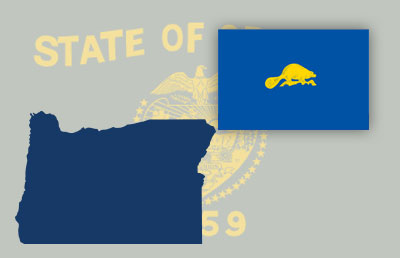Oregon Debt Collection: Debts Owed to the State and Debt Buyers

Senate Bill 254: Relating to Collection of Debts Owed to State
The Oregon state legislature has passed Senate Bill 254 which requires financial institutions to participate in a data match system established by the Department of Revenue (“the department”) to identify the accounts of delinquent debtors held at the financial institution.
“Using the data match system, not more than once per calendar quarter, each financial institution shall conduct a data match with the department that compares a list of delinquent debtors, identified by name and Social Security number or other taxpayer identification number, against a list of persons who hold accounts at the financial institution to enable the department to identify which, if any, delinquent debtors hold accounts at the financial institution. A financial institution is not required to seek or obtain any information about delinquent debtors beyond any information that is provided to the financial institution by the department.”
For the purposes of this data match requirement, a financial institution is defined as a depository institution, federal credit union or state credit union doing business in the state of Oregon.
The department is required to pay a fee each calendar quarter to the financial institution conducting the data match. The fee is capped at the lesser of $2,500 or actual costs when paid in the first quarter, and for each subsequent quarter the lesser of $150 or actual costs incurred by the financial institution. This fee may be added to the debt of the debtor with proper notice to the debtor.
If a financial institution fails to participate in the data match system or fails to comply with the rules established to administer the data match system, the department may impose a civil liability penalty on the financial institution.
A financial institution may be temporarily exempt from participation in the data match system requirement if:
- “The department determines that the participation of the financial institution in the data match system would not be cost-effective for the department;
- The department determines that the financial institution’s participation in the data match system would be unduly burdensome for the financial institution; or
- The financial institution provides the department with written notice from its supervisory banking authority that it has been determined to be undercapitalized, significantly undercapitalized, or critically undercapitalized, as those terms are defined under 12 C.F.R. 325.103(b) or 12 C.F.R. 702.102(a).”
House Bill 2356: Relating to Debt Collection Practices for Debt Buyers
The state of Oregon has passed House Bill 2356 which outlines the information that must be included initial pleading filed by a debt buyer seeking to bring legal action to collect a debt; and amends provisions concerning the licensing requirements for debt buyers.
The initial pleading for a legal action to collect the debt must include the following:
- “The original creditor’s name, written as the original creditor used the name in dealings with the debtor;
- The name, address and telephone number of the person that owns the debt and a statement as to whether the person is a debt buyer;
- The last four digits of the original creditor’s account number for the debt, if the original creditor’s account number for the debt had four or more digits;
- A detailed and itemized statement that shows:
- The amount the debtor last paid on the debt, if the debtor made a payment, and the date of the payment;
- The amount and date of the debtor’s last payment on the debt before the debtor defaulted or before the debt became charged-off debt, if the debtor made a payment;
- The balance due on the debt on the date on which the debt became charged-off debt;
- The amount and rate of interest, any fees and any charges that the original creditor imposed, if the debt buyer or debt collector knows the amount, rate, fee or charge;
- The amount and rate of interest, any fees and any charges that the debt buyer or any previous owner of the debt imposed, if the debt buyer or debt collector knows the amount, rate, fee or charge;
- The attorney fees the debt buyer or debt collector seeks, if the debt buyer or debt collector expects to recover attorney fees; and
- Any other fee, cost or charge the debt buyer seeks to recover; and
- The date on which the debt buyer purchased the debt.”
A person may not engage in debt buying unless the person obtains or renews a license as outlined in the requirements of this Bill. A license is not required to be obtained or renewed if the person is:
- “A financial institution, as defined in ORS 706.008;
- A mortgage banker or a mortgage broker, both terms as defined in ORS 86A.100;
- A person that has a license the Director of the Department of Consumer and Business
- Services issued under ORS 725.140;
- A company that the director has authorized to transact trust business in this state under ORS 709.005;
- A debt management service provider, as defined in ORS 697.602;
- An attorney who is authorized to practice law in this state, if the attorney engages in debt buying only incidentally in the practice of law; or
- A person that the director exempts from the requirement by rule or order after determining that the public interest does not require the person to obtain a license.”
Margaret Wright, JD, is regulatory compliance director with CLA. She is a graduate of Stonehill College and earned her juris doctor at Suffolk University Law School. She is admitted to the Massachusetts Bar.

Comments are closed.